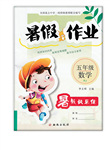题目内容
_______ speaking, I didn’t do it for you.
A. Honestly B. Honest C. Honest D. Dishonest
A
解析:Honestly speaking“老实说”。

 应用题作业本系列答案
应用题作业本系列答案 暑假作业暑假快乐练西安出版社系列答案
暑假作业暑假快乐练西安出版社系列答案
From the time I was seven, I had a dream of becoming a member of the Students Union. I always
31 my school leaders for taking responsibility for all of us. So I dreamed of being a leader.
Years flew by, and soon I was able to take part in the elections, 32 I would win. But the reality struck that I hadn’t had a chance. I wasn’t pretty. Girls across the school hardly knew me. I just did not have what it 33 to win a school election. I was depressed.
As I cried in my room that evening, I 34 took a deep breath and decided I wouldn’t stop dreaming. I decided that I would stand for elections again in my final year at school — and I would win.
I recognized that my 35 had a lot of things in their favor. What were the 36 that would work in my favor? I had good grades, and I was friendly and helpful. And my biggest strength was the
37 I had. I would not allow my plain appearance to hold me 38 from putting my best foot forward. That evening, I began my election plans a whole year ahead of time.
I realized that the girls would have to get to know me and recognize that I had the ability to 39
them. I loved making friends and I liked being helpful, 40 I decided that perhaps I could use these qualities to work to my advantage. In order to learn how to deliver a great election 41 , I also attended a course on effective public speaking.
The day after the election, when the principal announced I won the second highest number of votes, the students 42 . That joy on the faces of all my friends showed me that my victory was also theirs.
Suddenly, I realized that I had 43 much more than I had dreamed of. I had made many new friends and had helped people 44 the way. I had won the 45 and love of my school-mates and they knew me as somebody who would stand by them. I was able to put a smile on their faces and brighten their day.
| 【小题1】 |
|
| 【小题2】 |
|
| 【小题3】 |
|
| A.gradually | B.immediately | C.suddenly | D.impatiently |
| 【小题5】 |
|
| 【小题6】 |
|
| 【小题7】 |
|
| 【小题8】 |
|
| A.reconsider | B.accompany | C.represent | D.support |
| A.but | B.and | C.so | D.or |
| A.campaign | B.speech | C.meeting | D.promise |
| A.nodded | B.gathered | C.cheered | D.cried |
| A.gained | B.absorbed | C.devoted | D.developed |
| A.by | B.to | C.in | D.along |
| A.announcement | B.recognition | C.conclusion | D.arrangement |
Fear plays no part in this latest problem.“I’m not afraid I'll lose my children.I won't lose my children. We live together, and nothing, nothing,” she repeats, her voice rising when speaking to John's lawyer, “will stop me from being with my children. A law? Yeah, right. Don't disturb me when it comes to my children. You are never going to win. If John wants to see them, I cannot stop him. He's their father—I want them to see him! However, his visit in his present condition will disturb the children's stable (稳定的) life.”
John, who has spent much of his time in California, recently, has only hired a house for himself in Pennsylvania, according to his lawyer. "If he'd like to stick to a regular life, I'd be more than happy to do that," Jane says. "The best thing for any child of a divorced (离婚的) parent is a stable life. I want nothing more than for him to set up a stable life for himself, so that he can be part of making our children's lives more stable. "
While matters of money and care won't be settled for weeks, Jane hardly puts her life on hold. Last week the ABC network announced that Jane would return with her own show, Twist of Jane, in which she gives advice to other moms.Jane and her eight children will also return to ABC in a series of Jane Plus 8 specials showing them on various adventures.It’s a rest for Jane, who insists that she needs her new,busy life to provide for her family.“I have to lead such a life, and I’m thankful that I’ve built it to the top where now I can support my children.”she says.
And whether a bellicose(好斗的)dance judge or a bellicose former wife, Jane plans to keep on facing attacks on her. “Some people try to knock me down—only to make me more fierce,more protective,more determined to do better,”she says.“Go ahead, take me on. This will just make me stronger.”
【小题1】According to Jane in the first paragraph, the law
| A.can’t take her children away from her |
| B.can’t do anything with the case |
| C.will best settle the problem |
| D.will disturb her children |
| A.To live with John. |
| B.To hire a house for John. |
| C.To allow John to see the children |
| D.To ask John to set up a regular life. |
| A.Jane’s life is very difficult. |
| B.Jane continues to live as usual. |
| C.Jane almost can’t control her lire |
| D.Jane works very hard to live a happy life. |
| A.Proud. |
| B.Fierce. |
| C.Determined. |
| D.Independent |
 e effects are just as lasting.
e effects are just as lasting.